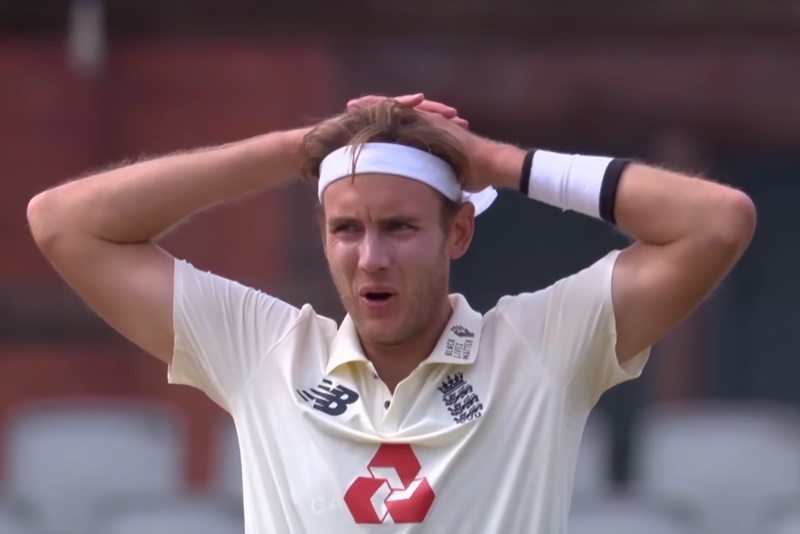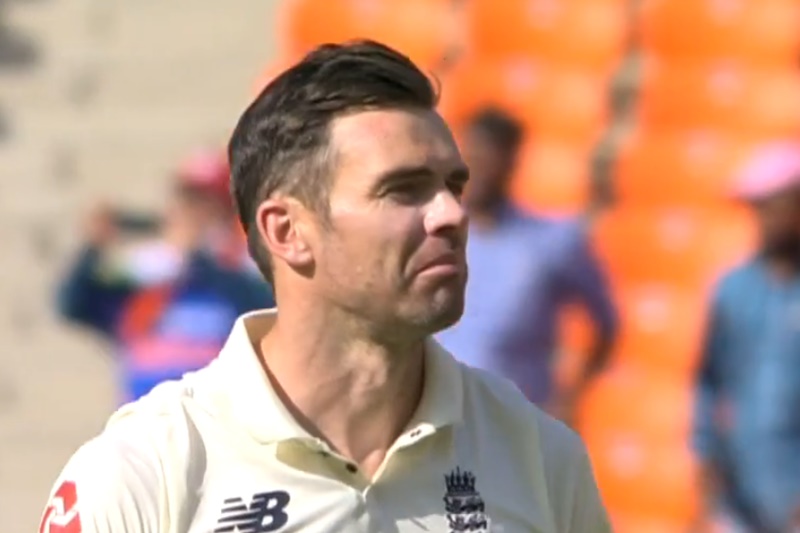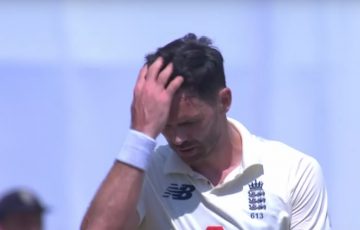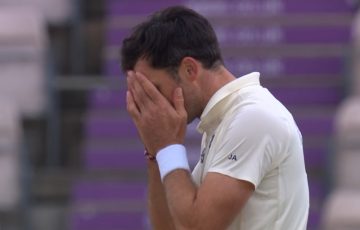James Anderson and Stuart Broad have been dropped from England’s Test squad. They’re not being rested. There’s no mention of that. They’re out. But they also might come back. It’s a soft binning.
There is more than one way to dispose of something you no longer want. There’s the unequivocal way – where you just open the bin and drop the item in – but there are equivocal ways too.
Garages, lofts, high-up cupboards. These are not so much storage locations as holding areas for the rubbish with which we have developed some kind of emotional bond. We make things easier for ourselves by moving these items into limbo to be disposed of on some unspecified future date.
> The Realm’s England XI – No.10 James Anderson
Anderson and Broad aren’t rubbish, of course. They are merely much-loved items that England are neither desperate to use nor dispose of.
So they’ve executed a soft binning.

“We felt that it was time to draw a line after the Ashes defeat, look forward and give some impetus with an influx of new players,” explained Andrew Strauss when announcing the squad for the upcoming West Indies tour.
“In respect of James Anderson and Stuart Broad, I want to emphasise this does not mean the end for them as England players,” he said. “It will be up to the new managing director and permanent head coach to decide on whether they will be involved this summer and beyond.”
Because that’s the scenario here. Anderson and Broad have been dropped by an interim management team. And that begs a question: If you’re dropped by a temporary coach and a temporary director of cricket, just how dropped are you? Really? How dropped are you when they explicitly float the possibility that you might return in the summer?
> Is Stuart Broad the most annoying cricketer there’s ever been?
At the same time, this is setting off down a particular path, isn’t it? It may well be down to the new Test coach to decide whether to ditch the nation’s two all-time top wicket-takers once and for all, but doing so would no longer be a bolt from the blue. It would be a bit more than a mere rubber-stamping but a lot less than springing it on everybody out of nowhere. That decision becomes a little easier. The initial heat of the furore will have passed. Half the plaster will already have been ripped off.
It becomes a recall rather than a retention too. Similar. But also different.
Is this devious machiavellianism on the part of Strauss et al? Probably not. But it’s nevertheless a decision that gives events a strong steer. They’ve given us not a clean break so much as a dirty fracture that may or may not heal.
This is the way the world ends. Not with a bang. But with an equivocal half-decision that will be reviewed by someone else at a later date.
King Cricket is an independent cricket website. All articles are free – and also available by email – but you can help fund us via Patreon.





Yes, but… Root back up to three.
Yikes.
Eh, the difference between 3 and 4 is like, one over.
I’d guess this is to give the new coach a clean slate when they come in. Colly’s taking the hit for them.
Brexit.
Anexit? An exit? Annex it?
‘This is the way the world ends. Not with a bang. But with an equivocal half-decision that will be reviewed by someone else at a later date.’
This is exactly the cathartic righteous anger I need to bathe in this morning.
I can’t spake.
I am having a clear out of stuff at the moment ahead of a potential move so the point about ‘rubbish with which we have developed some kind of emotional bond’ hits hard.
There are two main categories of stuff I seem to have kept longer than I perhaps should have: things that ‘I don’t need right now but could be needed in the future’ and ‘things that I keep around to look at every now and again to remind me of good times, but which there is no practical need for me to keep (and if I liked it that much I would probably have it on display)’.
Time will tell which category Broad and Anderson are put in…
I have a whole load of old stuff – mostly clothes and some gadgetry – that I have solely for travel – I never use/wear those things at home. Due to the pandemic, it is some time since I have been able to or chosen to travel, but I don’t want to throw that stuff away, even though I might not do that sort of travel again.
Broanderson, it seems to me, is the opposite of that. They are still stalwarts at home but no longer travel well. Why take them with us on our travels (e.g. the Windies) when they might still be perfectly useful at home – perhaps for another year or two? I can see a good argument for playing at least one of those two in each home test match for the next year or two – not least to help bring on the less experienced pace bowlers who are coming through. Whether or not either or both of them want(s) to fulfil that role is another matter.
No longer travel well? Anderson averaged 23.37 in the Ashes and Broad 26.30.
Yup, but that’s the past.
The travel plans for the next 12-15 months are, frankly, bonkers, with tests in Pakistan (or against Pakistan in UAE possibly) December, South Africa and New Zealand tests (and white ball cricket) to fit in before ODIs in Bangladesh in March 2023. Not entirely sure what the bonkers plans for 2023/24 might5 be, but I suspect that India must be part of that equation for financial (and to be fair, also for temporal) reasons. Younger players travel plans, those.
It’s so hard to keep track. We didn’t think there were Tests in South Africa.
I could be mistaken on that SA tour – the notices are unclear at this juncture, but as the NZ tests are outside the scope of the Test Championship I assumed that the SA tour would include tests that ARE part of it.
The extent and fragmented nature of the coming winter’s touring reinforces my point. Flying ageing stars half way across the world and expecting them to perform in two tests without proper preparation & warm-up matches doesn’t feel right, whereas working with them both – perhaps 3 or 4 tests each during a home season – makes more sense to me – if they want to continue their careers on that basis.
We seem to play NZ roughly every year for two-test ‘series’ these days. Doesn’t seem like a very efficient method and certainly not carbon-neutral. As the official test champions and for a long time consistently one of the top three sides in the world, it seems increasingly disrespectful to not play proper series (five tests) against them, or bolting a tour onto something else.
I wonder what the KonMari method would make of Broad and Anderson. Presumably they would be kept as they still bring us immense joy? Or is this selectorial half-decision the equivalent of folding them neatly and placing in a drawer for near-future use?
In the cold light of day one has to blame the bowlers for the ashes debacle. You can’t keep blaming it on batting collapses…..
With every player you have to weigh up what they bring to the team on the pitch versus what effect they have off the pitch.
In the post Ashes reports there was criticism of Rory Burns for not speaking up enough and I wonder how Anderson and Broad are seen by the less experienced and far less successful members of the dressing room. Anderson in particular has been around for so long he made his debut before all three of the selection panel that have just “dropped” him. You’d definitely be wary of upsetting them especially when coupled with the fact that both Broad and Anderson have fairly large media commitments when not playing. I’m not suggesting that Broad and Anderson are doing anything deliberately to upset teammates or make them uncomfortable but it may be a consequence.
With neither of them showing any signs of retirement maybe a push is needed. What is the next natural point for them to bow out? The next home Ashes series? I don’t think it suits the other players to constantly have to deal with retirement speculation.
With all that and the fact that even with them performing well we were still far from competitive in Australia, what is the benefit of keeping them around? They can’t go on forever, why not blood some replacements when the team is at (or close to) rock bottom?
There are usually two ways by which an international team is picked, which unless you are extremely lucky are contradictory. The first is to pick the best team for the match. This tends to be used when the match in question is one of the important ones in your schedule. The second is to pick a team that is “building for the future.” This tends to be done when you realize that a team picked by Method 1 still wouldn’t win.
This is clearly a Method 2 decision, in that it significantly weakens the only aspect of the squad that can still give England a chance. And that’s fine, as long as you stick to it. If you drop experienced and successful players with the goal of building for the future, literally the only thing you can do wrong is to then un-drop them. Reversing your decision destroys the reason for doing it in the first place, while still making you experience the pain of the original droppery. You lose the next matches, and then give up any future advantage you might have gained.
I think what I’m saying is that Broad and Anderson would almost certainly help England win the next series, but for the longer term it might be worth drawing a line under their careers. As long as that line is actually drawn. The equivocation you describe is literally the worst of all worlds, the compromise that is (to quote Stephen Fry) a stalling between two fools. And maybe more than anything that is the scary bit of this – that English cricket remains without direction, remains lost in committees, remains a gentlemen’s club in which longevity and comfort for its members are the only real goals.
Having temporary management figures making bold “strategic” decisions in the firm knowledge they won’t be around long-term seems symbolic of England’s approach in recent times.